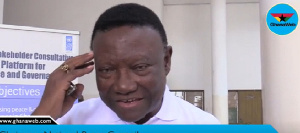 Reverend Professor Emmanuel Asante, Former Chairman, National Peace Council
Reverend Professor Emmanuel Asante, Former Chairman, National Peace Council
Reverend Professor Emmanuel Asante, Former Chairman, National Peace Council, says the pulpit remains a strong medium for promoting good moral and social values.
The theologian said religion played a key role in the development and nurturing of moral communities.
He therefore asked religious leaders to use the pulpit, their organisation, structures, sacred books, and position at home to promote social values, in order to build a better foundation for the nation to withstand the strong force of globalization on our culture.
Speaking at the 13th annual interfaith symposium, organised by the Centre for Interfaith Studies and Engagement in Africa, in Accra, Rev. Asante said “some religious leaders have compromised their faith and as a result have lost their moral rights.”
The symposium, on the theme: “Religions and moral fabric of a nation: Christian, Muslim and Primal Religious Perspective”, was to create the platform for Muslim, Christian and traditional leaders to deliberate on, and offer solutions to issues of mutual interest or concern.
It was also to engage with issues and rekindle the needed action to address them for the betterment of the society and help shape the moral fabric of the Ghanaian society for peace, security and development to prevail.
Rev. Asante said rights go with responsibilities and responsibilities rather than individual rights were the supreme principle of morality.
He said there was the need to intensify home training and find appropriate ways of making it work. Capacities of parents must be built to enable them teach their children the right values right from infancy. Once a good foundation is laid at home, children would grow to become responsible citizens.
He noted that moral education must also be made compulsory in education at all level, and a relevant philosophy of education must be built to allow individuals to be directed to the ideal of patriotism and citizenship.
Rev. Asante said “the problem that we are confronted with in relation to the LGBTQI would not have been an issue if we had laid the proper foundation and the youth knew what human sexuality is about. We do not talk about sex and we expect our children to understand our religious position on sex.
“These are the things we need to teach if we are to stem the tide of the so called civilization that seem to be disturbing us in our country. We have a responsibility towards our children. Religion is the salt and light of a community, since its positive influence arising out of the spiritual and moral teaching can have a lasting effect on society.”
Imam Sa’id Muktar Abubakar, Officiating Imam, Dar es Salam Mosque, said Islam was universal in the matter of morality, and morality was similitude to the principle of proper way of life.
He said Islam also considers the human being as the creation of God, and therefore the human being did nothing by himself, hence the issue of morality taken from the individual, states, traditions and religious perspectives drew its roots from what God has said.
Imam Abubakar said the human being was an embodiment of morality, and God gave humans both desire and intellect, to be able to use the intellect to control their desires at all times.
He said “in the issue of morality, we are all at the same pedestal no matter our religion, so the desire to ensure the safety of self must be paramount, and called on all to do daily checks of themselves as well as the morality of their children.”
Nene Sakite II, Kornor of Manya Krobo and President, Eastern Regional House of Chief’s, said the traditionalist held in high esteem the issues of integrity, high moral standards and never comprised.
He said “as a people, there was the need to appreciate who and what we are. We cannot copy what others do because we have our own standards and virtues. There is a thin line between Islam, Christianity and Traditional religion, and if we are able to adhere to the principles of our religions our moral fabric would be solid.”
Nene Sakite said the youth must be made aware that beliefs and values were important to the family and fabric of society, and as such must exhibit positive attitudes at all times because that was what kept societies together.
He called on families to be involved in the training of their children, adding that there was the need for a more tailored constitution of Ghana that would take into consideration traditional practices that projected the Ghanaian identity.